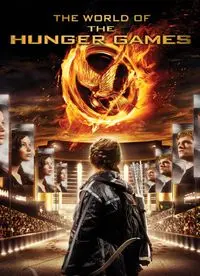
The World of the Hunger Games PDF
Preview The World of the Hunger Games
Contents Cover Title Introduction Welcome to Panem Life in the Districts Life in District 12 People of District 12 Katniss Everdeen At Home with Katniss Everdeen Reaping Day Life in the Capitol People of the Capitol Tributes in the Capitol Training for the Hunger Games Creatures of Panem Perils of the Hunger Games The Cornucopia Fear Injuries Alliances Defiance Rule Changes Love Lies Last Move The Game of Love After the Games The Hunger Games Glossary Copyright You know this world, where it’s easy to get confused between reality and reality TV. You know this place, where rich and poor live side by side but worlds apart. You, too, might question the choices a government makes on your behalf. You, too, have seen the environment abused, damaged beyond repair. This place is Panem, the world of The Hunger Games. But it has roots in a world you know already: your own. It’s not that hard to imagine a path from here to there. That’s part of what makes Suzanne Collins’s trilogy so mesmerizing. Drawing on Roman history, Greek mythology, war stories, and her long experience as a scriptwriter and storyteller, Collins has created a dystopian world that feels at once foreign and unsettling yet familiar. Now filmmakers have brought Collins’s world to life in all its color and complexity. If you’re trying to get oriented — or if you already know the way — let this book be your guide to the world of The Hunger Games. Long ago, this place was known as North America. That was before the droughts and the disasters, the storms and the fires, the floods and the war. That was before a powerful new force rose from the ashes to create order and rule with an iron hand. Now this place is called Panem. It consists of twelve districts surrounding one shining Capitol. The Capitol is Panem’s seat of power and its largest city. Nestled in a mountain range once called the Rockies, it towers above the districts and is accessible only through long tunnels. The mountains protect the Capitol from intruders and insulate it from the districts. The districts contain sparkling waters, lush forests, majestic mountains — and miserable people. These people fish those waters, fell those forests, and mine those mountains, all to meet the Capitol’s needs. But there is no feast quite big enough, no fashion quite new enough for the Capitol. The people of the districts give their labor — they give their lives — all to feed the Capitol’s insatiable appetites. Meanwhile, people are starving. Some districts are favored by the Capitol: those that produce weapons and luxury goods. There, at least, the people have enough to eat. But even they have no opportunity beyond what the Capitol dictates. Under such conditions, you might expect a revolution. That’s been tried before. During the Dark Days, the districts attempted rebellion. All were defeated, and one — District 13 — was destroyed. Now it’s a smoldering ruin, a reminder of what happens to those who defy the Capitol. The annual Hunger Games are another reminder. Every year, each district sends two tributes, a boy and a girl, to compete in a fight to the death on live TV. The message is clear. In retribution for the long-ago rebellion, the Capitol will take whatever it wants from the people of the districts. Even the lives of their children. The victor of the Hunger Games receives riches for life. His or her district is showered with gifts. Really, though, the Capitol is always the true winner. Panem is a place of nightmares, but it’s also a place we can understand, with its intractable injustices and its fine line between reality and “reality” as created for a broadcast. It’s like the world as we know it — gone terribly wrong.
